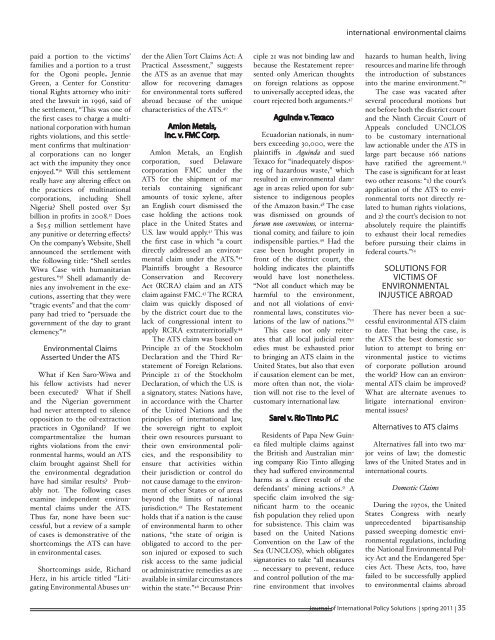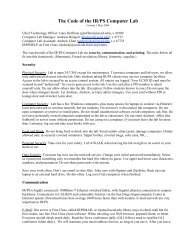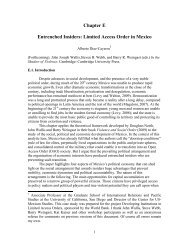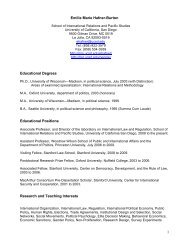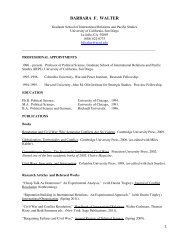to download the full journal. (1.2MB PDF) - School of International ...
to download the full journal. (1.2MB PDF) - School of International ...
to download the full journal. (1.2MB PDF) - School of International ...
Create successful ePaper yourself
Turn your PDF publications into a flip-book with our unique Google optimized e-Paper software.
international environmental claims<br />
paid a portion <strong>to</strong> <strong>the</strong> victims’<br />
families and a portion <strong>to</strong> a trust<br />
for <strong>the</strong> Ogoni people. Jennie<br />
Green, a Center for Constitutional<br />
Rights at<strong>to</strong>rney who initiated<br />
<strong>the</strong> lawsuit in 1996, said <strong>of</strong><br />
<strong>the</strong> settlement, “This was one <strong>of</strong><br />
<strong>the</strong> first cases <strong>to</strong> charge a multinational<br />
corporation with human<br />
rights violations, and this settlement<br />
confirms that multinational<br />
corporations can no longer<br />
act with <strong>the</strong> impunity <strong>the</strong>y once<br />
enjoyed.” 36 Will this settlement<br />
really have any altering effect on<br />
<strong>the</strong> practices <strong>of</strong> multinational<br />
corporations, including Shell<br />
Nigeria? Shell posted over $31<br />
billion in pr<strong>of</strong>its in 2008. 37 Does<br />
a $15.5 million settlement have<br />
any punitive or deterring effects?<br />
On <strong>the</strong> company’s Website, Shell<br />
announced <strong>the</strong> settlement with<br />
<strong>the</strong> following title: “Shell settles<br />
Wiwa Case with humanitarian<br />
gestures.” 38 Shell adamantly denies<br />
any involvement in <strong>the</strong> executions,<br />
asserting that <strong>the</strong>y were<br />
“tragic events” and that <strong>the</strong> company<br />
had tried <strong>to</strong> “persuade <strong>the</strong><br />
government <strong>of</strong> <strong>the</strong> day <strong>to</strong> grant<br />
clemency.” 39<br />
Environmental Claims<br />
Asserted Under <strong>the</strong> ATS<br />
What if Ken Saro-Wiwa and<br />
his fellow activists had never<br />
been executed? What if Shell<br />
and <strong>the</strong> Nigerian government<br />
had never attempted <strong>to</strong> silence<br />
opposition <strong>to</strong> <strong>the</strong> oil-extraction<br />
practices in Ogoniland? If we<br />
compartmentalize <strong>the</strong> human<br />
rights violations from <strong>the</strong> environmental<br />
harms, would an ATS<br />
claim brought against Shell for<br />
<strong>the</strong> environmental degradation<br />
have had similar results? Probably<br />
not. The following cases<br />
examine independent environmental<br />
claims under <strong>the</strong> ATS.<br />
Thus far, none have been successful,<br />
but a review <strong>of</strong> a sample<br />
<strong>of</strong> cases is demonstrative <strong>of</strong> <strong>the</strong><br />
shortcomings <strong>the</strong> ATS can have<br />
in environmental cases.<br />
Shortcomings aside, Richard<br />
Herz, in his article titled “Litigating<br />
Environmental Abuses under<br />
<strong>the</strong> Alien Tort Claims Act: A<br />
Practical Assessment,” suggests<br />
<strong>the</strong> ATS as an avenue that may<br />
allow for recovering damages<br />
for environmental <strong>to</strong>rts suffered<br />
abroad because <strong>of</strong> <strong>the</strong> unique<br />
characteristics <strong>of</strong> <strong>the</strong> ATS. 40<br />
Amlon Metals,<br />
Inc. v. FMC Corp.<br />
Amlon Metals, an English<br />
corporation, sued Delaware<br />
corporation FMC under <strong>the</strong><br />
ATS for <strong>the</strong> shipment <strong>of</strong> materials<br />
containing significant<br />
amounts <strong>of</strong> <strong>to</strong>xic xylene, after<br />
an English court dismissed <strong>the</strong><br />
case holding <strong>the</strong> actions <strong>to</strong>ok<br />
place in <strong>the</strong> United States and<br />
U.S. law would apply. 41 This was<br />
<strong>the</strong> first case in which “a court<br />
directly addressed an environmental<br />
claim under <strong>the</strong> ATS.” 42<br />
Plaintiffs brought a Resource<br />
Conservation and Recovery<br />
Act (RCRA) claim and an ATS<br />
claim against FMC. 43 The RCRA<br />
claim was quickly disposed <strong>of</strong><br />
by <strong>the</strong> district court due <strong>to</strong> <strong>the</strong><br />
lack <strong>of</strong> congressional intent <strong>to</strong><br />
apply RCRA extraterri<strong>to</strong>rially. 44<br />
The ATS claim was based on<br />
Principle 21 <strong>of</strong> <strong>the</strong> S<strong>to</strong>ckholm<br />
Declaration and <strong>the</strong> Third Restatement<br />
<strong>of</strong> Foreign Relations.<br />
Principle 21 <strong>of</strong> <strong>the</strong> S<strong>to</strong>ckholm<br />
Declaration, <strong>of</strong> which <strong>the</strong> U.S. is<br />
a signa<strong>to</strong>ry, states: Nations have,<br />
in accordance with <strong>the</strong> Charter<br />
<strong>of</strong> <strong>the</strong> United Nations and <strong>the</strong><br />
principles <strong>of</strong> international law,<br />
<strong>the</strong> sovereign right <strong>to</strong> exploit<br />
<strong>the</strong>ir own resources pursuant <strong>to</strong><br />
<strong>the</strong>ir own environmental policies,<br />
and <strong>the</strong> responsibility <strong>to</strong><br />
ensure that activities within<br />
<strong>the</strong>ir jurisdiction or control do<br />
not cause damage <strong>to</strong> <strong>the</strong> environment<br />
<strong>of</strong> o<strong>the</strong>r States or <strong>of</strong> areas<br />
beyond <strong>the</strong> limits <strong>of</strong> national<br />
jurisdiction. 45 The Restatement<br />
holds that if a nation is <strong>the</strong> cause<br />
<strong>of</strong> environmental harm <strong>to</strong> o<strong>the</strong>r<br />
nations, “<strong>the</strong> state <strong>of</strong> origin is<br />
obligated <strong>to</strong> accord <strong>to</strong> <strong>the</strong> person<br />
injured or exposed <strong>to</strong> such<br />
risk access <strong>to</strong> <strong>the</strong> same judicial<br />
or administrative remedies as are<br />
available in similar circumstances<br />
within <strong>the</strong> state.” 46 Because Principle<br />
21 was not binding law and<br />
because <strong>the</strong> Restatement represented<br />
only American thoughts<br />
on foreign relations as oppose<br />
<strong>to</strong> universally accepted ideas, <strong>the</strong><br />
court rejected both arguments. 47<br />
Aguinda v. Texaco<br />
Ecuadorian nationals, in numbers<br />
exceeding 30,000, were <strong>the</strong><br />
plaintiffs in Aguinda and sued<br />
Texaco for “inadequately disposing<br />
<strong>of</strong> hazardous waste,” which<br />
resulted in environmental damage<br />
in areas relied upon for subsistence<br />
<strong>to</strong> indigenous peoples<br />
<strong>of</strong> <strong>the</strong> Amazon basin. 48 The case<br />
was dismissed on grounds <strong>of</strong><br />
forum non conveniens, or international<br />
comity, and failure <strong>to</strong> join<br />
indispensible parties. 49 Had <strong>the</strong><br />
case been brought properly in<br />
front <strong>of</strong> <strong>the</strong> district court, <strong>the</strong><br />
holding indicates <strong>the</strong> plaintiffs<br />
would have lost none<strong>the</strong>less.<br />
“Not all conduct which may be<br />
harmful <strong>to</strong> <strong>the</strong> environment,<br />
and not all violations <strong>of</strong> environmental<br />
laws, constitutes violations<br />
<strong>of</strong> <strong>the</strong> law <strong>of</strong> nations.” 50<br />
This case not only reiterates<br />
that all local judicial remedies<br />
must be exhausted prior<br />
<strong>to</strong> bringing an ATS claim in <strong>the</strong><br />
United States, but also that even<br />
if causation element can be met,<br />
more <strong>of</strong>ten than not, <strong>the</strong> violation<br />
will not rise <strong>to</strong> <strong>the</strong> level <strong>of</strong><br />
cus<strong>to</strong>mary international law.<br />
Sarei v. Rio Tin<strong>to</strong> PLC<br />
Residents <strong>of</strong> Papa New Guinea<br />
filed multiple claims against<br />
<strong>the</strong> British and Australian mining<br />
company Rio Tin<strong>to</strong> alleging<br />
<strong>the</strong>y had suffered environmental<br />
harms as a direct result <strong>of</strong> <strong>the</strong><br />
defendants’ mining actions. 51 A<br />
specific claim involved <strong>the</strong> significant<br />
harm <strong>to</strong> <strong>the</strong> oceanic<br />
fish population <strong>the</strong>y relied upon<br />
for subsistence. This claim was<br />
based on <strong>the</strong> United Nations<br />
Convention on <strong>the</strong> Law <strong>of</strong> <strong>the</strong><br />
Sea (UNCLOS), which obligates<br />
signa<strong>to</strong>ries <strong>to</strong> take “all measures<br />
… necessary <strong>to</strong> prevent, reduce<br />
and control pollution <strong>of</strong> <strong>the</strong> marine<br />
environment that involves<br />
hazards <strong>to</strong> human health, living<br />
resources and marine life through<br />
<strong>the</strong> introduction <strong>of</strong> substances<br />
in<strong>to</strong> <strong>the</strong> marine environment.” 52<br />
The case was vacated after<br />
several procedural motions but<br />
not before both <strong>the</strong> district court<br />
and <strong>the</strong> Ninth Circuit Court <strong>of</strong><br />
Appeals concluded UNCLOS<br />
<strong>to</strong> be cus<strong>to</strong>mary international<br />
law actionable under <strong>the</strong> ATS in<br />
large part because 166 nations<br />
have ratified <strong>the</strong> agreement. 53<br />
The case is significant for at least<br />
two o<strong>the</strong>r reasons: “1) <strong>the</strong> court’s<br />
application <strong>of</strong> <strong>the</strong> ATS <strong>to</strong> environmental<br />
<strong>to</strong>rts not directly related<br />
<strong>to</strong> human rights violations,<br />
and 2) <strong>the</strong> court’s decision <strong>to</strong> not<br />
absolutely require <strong>the</strong> plaintiffs<br />
<strong>to</strong> exhaust <strong>the</strong>ir local remedies<br />
before pursuing <strong>the</strong>ir claims in<br />
federal courts.” 54<br />
SOLUTIONS FOR<br />
VICTIMS OF<br />
ENVIRONMENTAL<br />
INJUSTICE ABROAD<br />
There has never been a successful<br />
environmental ATS claim<br />
<strong>to</strong> date. That being <strong>the</strong> case, is<br />
<strong>the</strong> ATS <strong>the</strong> best domestic solution<br />
<strong>to</strong> attempt <strong>to</strong> bring environmental<br />
justice <strong>to</strong> victims<br />
<strong>of</strong> corporate pollution around<br />
<strong>the</strong> world? How can an environmental<br />
ATS claim be improved?<br />
What are alternate avenues <strong>to</strong><br />
litigate international environmental<br />
issues?<br />
Alternatives <strong>to</strong> ATS claims<br />
Alternatives fall in<strong>to</strong> two major<br />
veins <strong>of</strong> law; <strong>the</strong> domestic<br />
laws <strong>of</strong> <strong>the</strong> United States and in<br />
international courts.<br />
Domestic Claims<br />
During <strong>the</strong> 1970s, <strong>the</strong> United<br />
States Congress with nearly<br />
unprecedented bipartisanship<br />
passed sweeping domestic environmental<br />
regulations, including<br />
<strong>the</strong> National Environmental Policy<br />
Act and <strong>the</strong> Endangered Species<br />
Act. These Acts, <strong>to</strong>o, have<br />
failed <strong>to</strong> be success<strong>full</strong>y applied<br />
<strong>to</strong> environmental claims abroad<br />
Journal <strong>of</strong> <strong>International</strong> Policy Solutions | spring 2011 | 35


